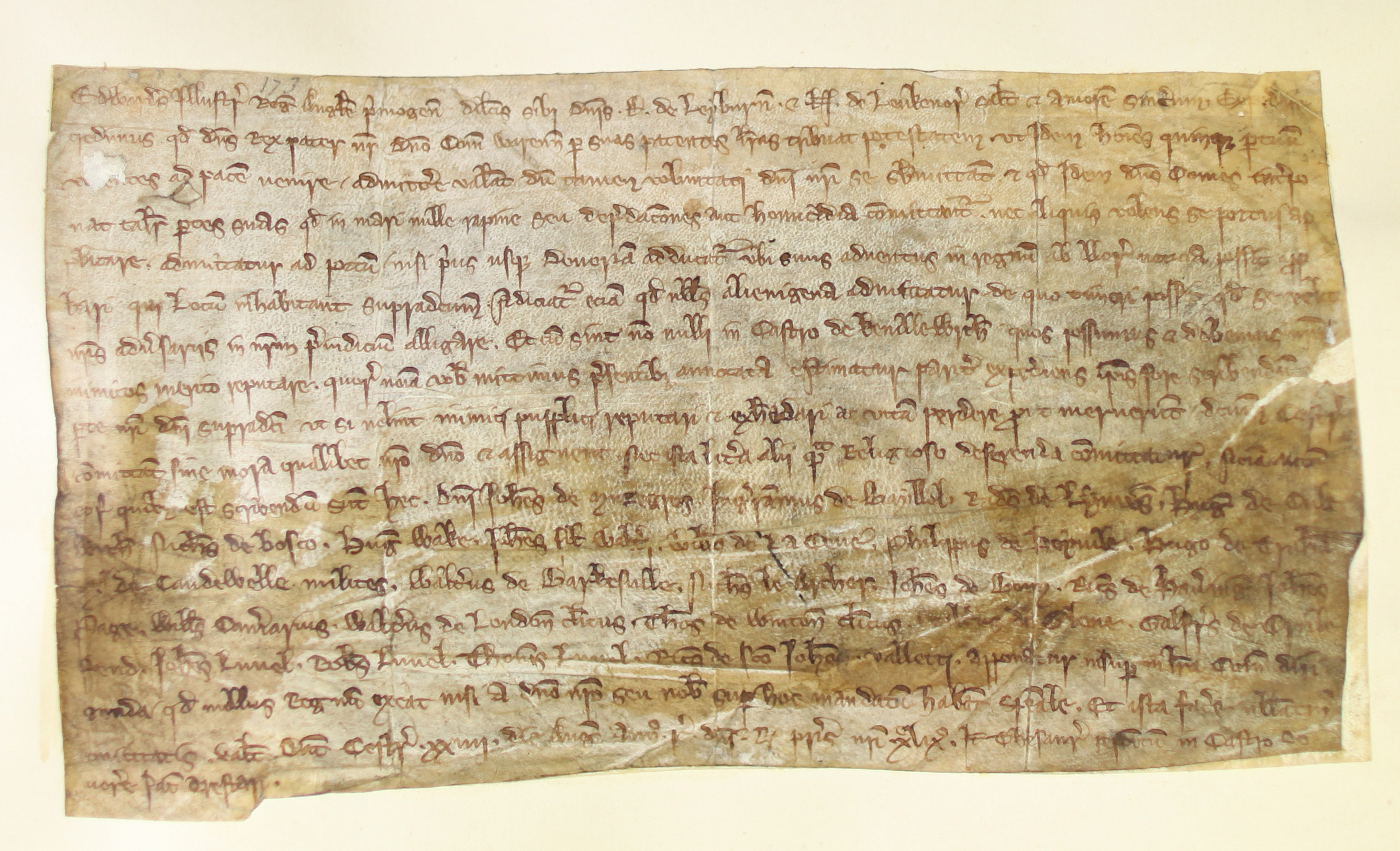
Latin Transcript
Edwardus Illustris Regis Anglie primogenitus dilectis sibi dominis R. de Leyburn’ et N. de Leukenor’ salutem et amorem sincerum. Ex … / credimus quod dominus Rex pater noster Domino Comiti Warenn’ per suas patentes litteras tribuat potestatem vt Idem homines quinque portuum / volentes ad pacem uenire admittere valeat dum tamen voluntati domini nostri se submittant et quod Idem dominus Comes interpo/nat taliter partes suas quod in mari nulle rapine seu depredaciones aut homicidia committantur nec aliquis volens se portus ap/probitare admittatur ad portum nisi prius usque Doueriam adducatur vbi suus aduentus in regnum ab illorum noticia possint appro/bari qui Locum inhabitant supradictum fidiciatur eciam quod nullus alienigena admittatur de quo timeri possit quod se vel / nostris aduersariis in nostrum preiudicium alligare. Et cum sint non nulli in Castro de Kenillewrth’ quos possimus et debemus nostros / inimicos merito reputare quorum nomina vobis mittimus presentibus annotata estimatur pariter expediens ipsis scire scribendum [ex] / parte nostri domini supradicti vt si noluit inimicus pupplicus reputari et exheredari ac vitam perdere prout meruerunt dictum Castrum / committant sine mora qualibet nostro domino et assignent set ista litera alii qua Religioso deferenda committatur. Nomina … / eos quibus est scribendum sunt hec: Dominus Johannes de Mucegros, Ingeramus de Bayllol, Radulphus de Lymes’, Hugo de Cul/wrth’, Nicholaus de Bosco, Hugo Wake, Johannes filius Walteri, Willelmus de la Cene, Philippus de Heyuile, Hugo de Truham, / [.] de Caudewelle, milites; Walterus de Barkesuile, Nicholaus le Archer, Johannes de Boun, Ricardus de Hauering’, Johannes / Page, Willelmus Camerarius, Walterus de London’ clericus, Thomas de Winton’ clericus, Walterus de Glene, Galfridus de Crule/feud, Johannes Luuel, Robertus Luuel, Thomas Luuel, Ricardus de Sancto Johanne, valetti apponatur insuper in littera Com’ diri/gunda quod nullus Regnum exeat nisi a domino nostro seu nobis super hoc mandatum habeat speciale. Et ista facere nullatenus / omittatis. Valete. Datum Cestrie xxiiij die Augusti anno regni domini Regis patris nostri xlix. Item Thesaurum repositum in Castro Do/uerere arestari.
Translation
Edward [Edward I] first-born of the illustrious King of England [Henry III] to his beloved lords R[oger] de Leyburn and N[icholas] of Lewknor, greetings and since love. We believe it expedient that the Lord King, our father, should bestow power by his letters patent upon the Earl Warenne so that he might admit the men of the Cinque Ports wishing to come to peace, as long as they shall submit themselves to the will of our lord, and that the same lord earl shall reinforce to those parties that they shall commit at sea no robbery or depredation or murders and nor shall anyone wishing to approach port be admitted unless they shall first have been taken to Dover where their arrival into the kingdom shall be approved upon receiving notice from them, those who inhabit that above said place shall stand surety for them, and also that no alien be admitted about whom it might be feared that might involve themselves or our adversaries in activities that might be to our prejudice. And whereas there are many in the castle of Kenilworth whom we might and ought to repute rightfully as our enemies, the names of whom we send to you with the present letters, it is esteemed worthwhile writing to them on behalf of our lord abovesaid that, if they do not wish to be reputed as a public enemy and disinherited, and lose their life as they shall merit, they are to commit and assign the said castle without any delay to our lord, but he is to commit these letters to another man of religion to be delivered. The names of those to whom should be written are these: Sir John de Mucegros, Ingram de Balliol, Ralph de Lymes’, Hugo de Culwrth’, Nicholas de Bosco, Hugh Wake, John fitzWalter, William de la Cene, Philip de Heyuile, Hugh de Truham, / [.] de Caudewelle, knights; Walter de Barkesuile, Nicholas le Archer, John de Boun, Ricardus de Hauering’, John / Page, William Chamberlain, Walter of London, clerk, Thomas of Winchester, clerk, Walter de Glene, Geoffrey de Crulefeud, John Lovel, Robert Lovel, Thomas Lovel, Richard de Sancto Johanne, valets. Furthermore, it is to be added in the letters to be directed to the earl that none may leave the kingdom unless he shall have a special mandate from our lord or us concerning this. And he is not to omit to do this in any way. Farewell. Given at Chester, 24 August in the 49th year of the reign of our lord the king, our father. Moreover, the treasure stored within the castle of Dover is to be arrested.
Letter from the Lord Edward to Roger de Leyburn and Nicholas of Lewknor, 24 August 1265, Catalogue ref: SC 1/12/12
During the reign of Henry III, England experienced a period of civil war in the 1260s. The rebels who fought against the king were led by Simon de Monfort, Earl of Leicester. After his death, Kenilworth Castle, which he had received from Henry III in 1253, remained in rebel hands and was subjected to a long siege.
- Why do you think this source was written in Latin?
- What does this letter reveal about the importance of Kenilworth Castle in the Barons’ War?
- What kind of measures does Edward advocate for the safety of England?
- Why do you think the named knights are at Kenilworth?
